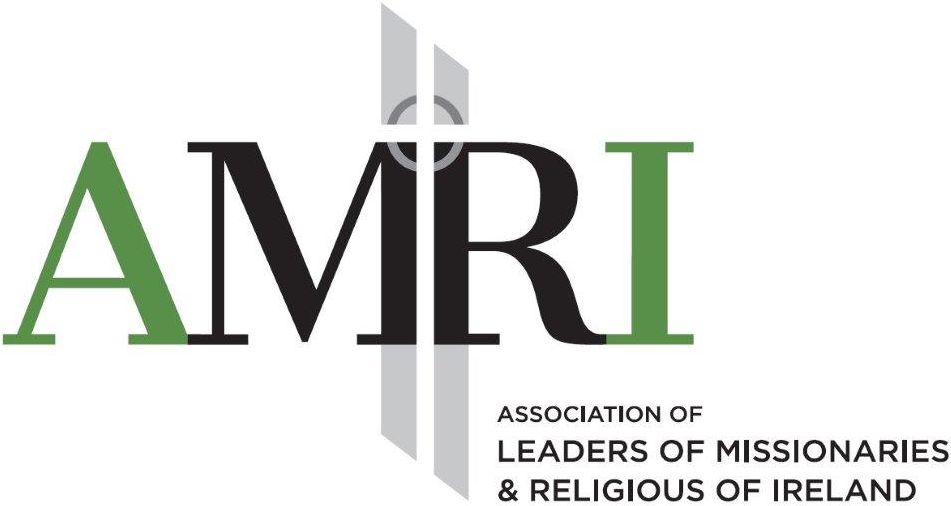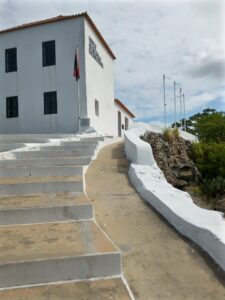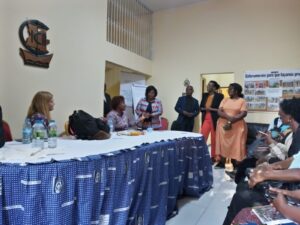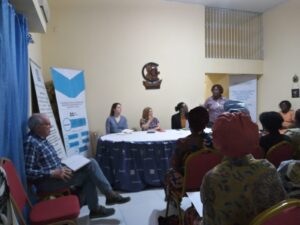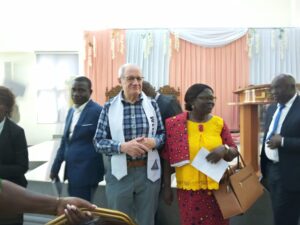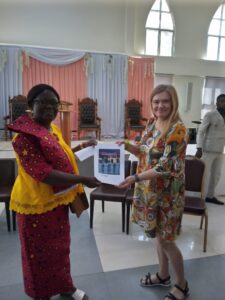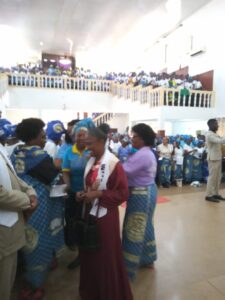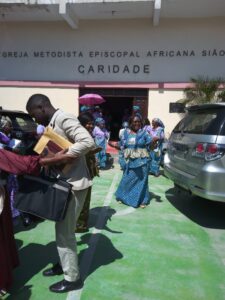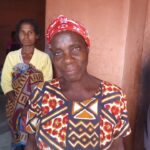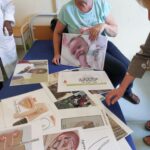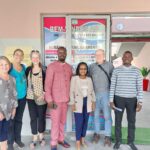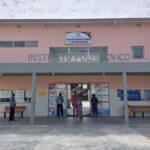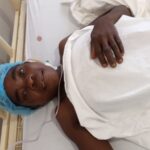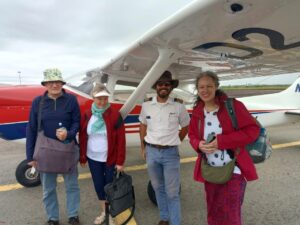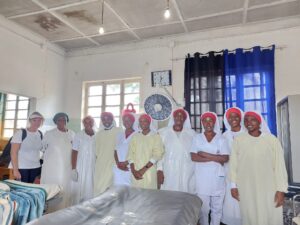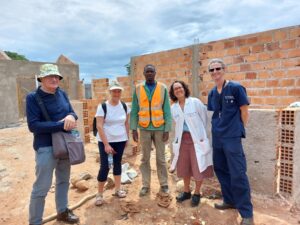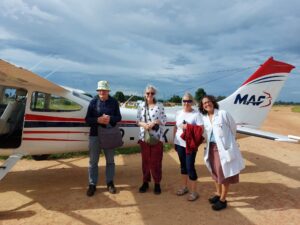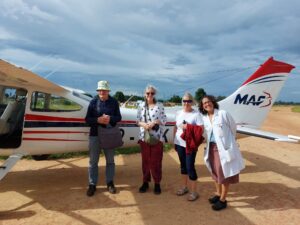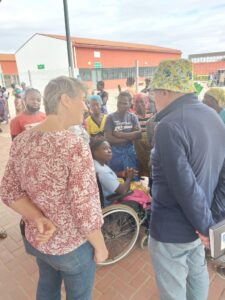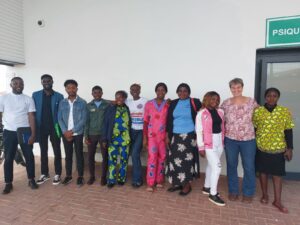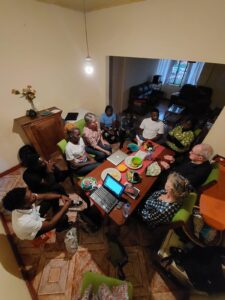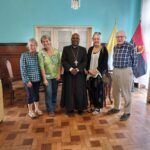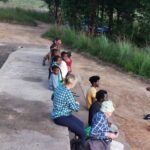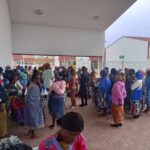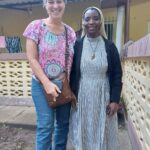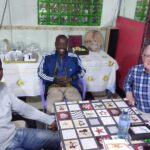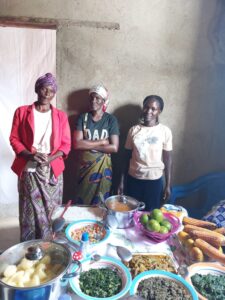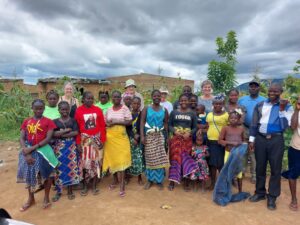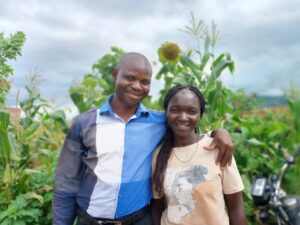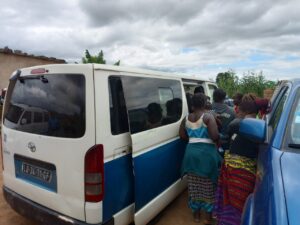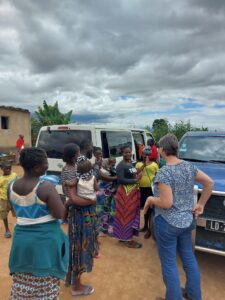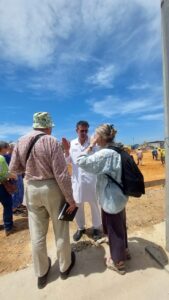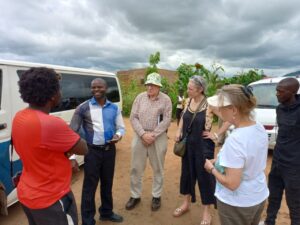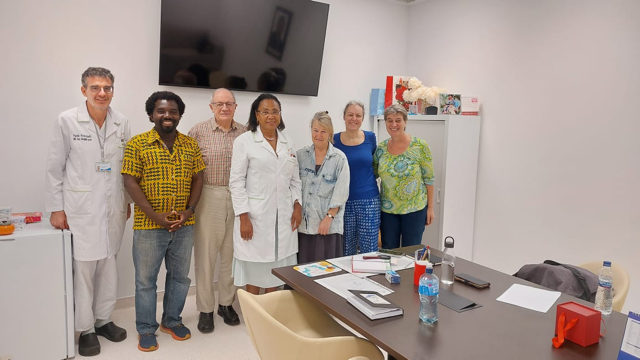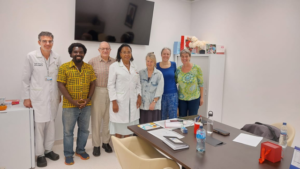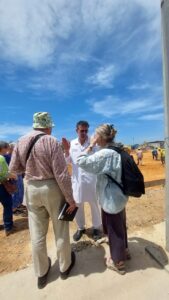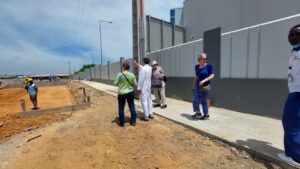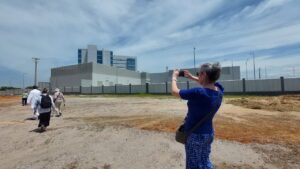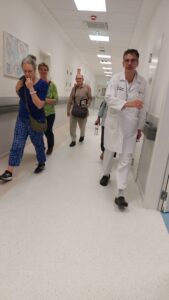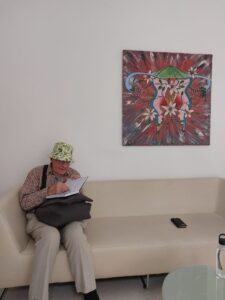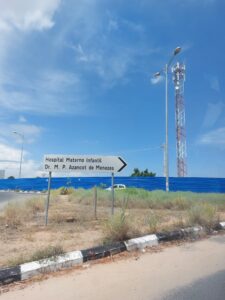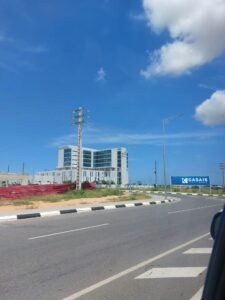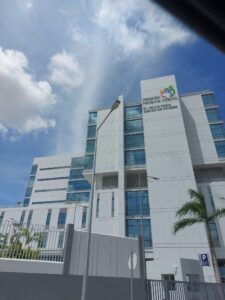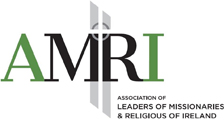AMRI Visit to Angola January 2024 – Eradication of Obstretric Fistula
Toni Pyke who leads the JPIC desk in AMRI will undertake a field trip to Angola 8-21 January. This will help form part of a wider campaign leading towards International Day of Eradication fo Obstretic Fistual – May 23rd.
Throughout the visit she will send some videos, interviews and a diary of her experience on the ground. Toni returned safely to Dublin on 21 January. You can read her experience below.
Post 7
Updates from Fr. Edward Flynn in Angola:
Yesterday morning, we visited museums. We travelled first to a rocky section of the coastline facing the Mussulo chain of islands to view the slave museum housed in a white painted building.
The museum is built on land once owned by the son of Pedro Matoso de Andrade, one of Angola’s most infamous slave-traders. Here, slaves were kept in yards before they were marched onto ships to be transported to Brazil and the Americas before slavery was abolished in Angola in 1858. We entered the Chapel where the slaves were baptised and viewed the various exhibits showing methods of torture and depicting the history of this shameful trade.
In the afternoon we gathered with a women’s group of 25 representatives of Churches to reflect on violence in Angola and its impact on women. Nicky Ashwood gave a presentation on gender-based violence using stories of rape and abuse from the Bible, taking us back to reflect on passages from Genesis, the books of Samuel and Judges. Group discussions highlighted the relevance of these stories to today’s reality in Angola and how as people of faith we might make an appropriate and non-violent response.
Post 6
While AMRI’s Toni Pyke safely returned to Ireland from Angola, Fr. Edward and Eirene remained in Luanda, Angola to participate in a series of meetings organised by the World Council of Churches. Fr. Edward writes that a four person delegation arrived from Europe to participate in those meetings with Church leaders, NGOs, the UN, UN Women and government representatives from the Department of Health.
On Monday we had a 6.30 start to our day to beat the traffic and to travel the 18 kms to downtown Luanda for our meetings at the offices of the National Council of Churches (CICA). We visited the central office of the Council of Christian Churches in Angola (CICA) where we met Rev Deolinda Teka, the General Secretary, who stressed the importance of good relations with the WCC in Geneva. She then Highlighted a couple of the topics that would be addressed during our visit, particularly the issue of Gender-based violence and Obstetric Fistula.
Later in the morning we were welcomed with song and dance at a Methodist Church where a large group (several hundred) women were gathered for the presentation of the Church’s plan for 2024. At mid-day we were received at a Baptist Church in Samba where we discussed more in detail our work on the prevention of Fistula and the efforts of the WCC to counter Gender-based violence. The discussion continued with a powerful witness from a lady who spoke about the impact of Obstetric Fistula on many women.
Post 5
18th Jan
On Thursday, Eirene and Mary (Voltoka) went to the mother and child hospital in Cuito to meet with the provincial focal point for reproductive health and midwives working at the hospital. Toni and Fr. Edward made a courtesy call to the Bishop of Cuito’s residence. There we met with the assistant to the administrator, and outlined the work we and our partner Votoka are engaged in the prevention of obstetric fistula, asking for the support of the Diocese in raising awareness of the issue among its schools and parishes.
We then travelled to the Centro De Suade (Health Centre) and a provincial hospital to meet with fistula patients after their repair surgery. We went to visit the families of some of the women and met a traditional birth attendant (TBA) who works with over 500 TBAs across her province educating the local women on prevention and safe maternal health.
One outcome of the meeting with TBAs in the morning was that our team to meet with the Director of Instituto Politecnico, Philipe Almedo. The Institute was the first technical college to provide specific health training in Angola. Courses include general nursing, radiology, and clinical analysis. The specialist courses include midwifery, intensive care, and surgical instrumentation. An outcome of this meeting was the opportunity for the team at Votoka to include the issue of obstetric fistula within the curriculum of the midwifery training.
Before driving back to Huambo, I wanted to see how the patient from the surgery I witnessed the night before was recuperating. Given the trauma of her surgery, she was still at the Dr. Walter Strangway Hospital beside the Politecnico. Since she did not speak Portuguese, we sought out a translator among the women who could translate from Portuguese to XXX for the nurse to communicate with her.
17 Jan
On Wednesday, 17th January we flew back from Lubango to Cuito with MAF. We went straight to Dr. Strangway Hospital to visit patients, the Votoka team and the team of doctors, nurses’ assistants and other staff supporting the first Obstetric Fistula Campaign of the year. Two of our group were fortunate to witness two fistula repair operations in the operating theatre. One of the patients had lived with a fistula for over 15 years. Hers was a complicated repair operation.
16 Jan
In the morning we met with a local pastor at an Anglican church who is actively engaged in the prevention of obstetric fistula. We then travelled to the Evangelical Medical Centre (CEML) in Lubango where we met with Dr. Steve Foster who has lived in Angola for 5 decades. He founded the Mission hospital and is now training surgeons and specialist doctors at the hospital. The hospital also conducts fistula repair surgeries and facilitates a ‘waiting room’ where patients spend 3-4 weeks to recover from their surgery. Whilst recovering, the women learn skills such as sewing, basket making and designing greeting cards.
In the afternoon we shadowed Audrey Henderson, a nurse at the hospital during her community rounds to local rural villages.
Post 4
The next day we travelled to Kalukembe with MAF – Mission Aviation Fellowship. At the mission hospital we met Drs Priscilla and Dan Cummings who gave a tour of the hospital, introduced the medical personnel and some of the patients. Medical staff there also undertake fistula repair surgery. We discussed the prevention of obstetric fistula and some of the challenges that are encountered in achieving this mission.
In the afternoon we flew another 1hour to Lubango to visit the CEML hospital. CEML is Evangelical Medical Centre Lubango
Post 3
On Sunday we participated in the celebration of the Eucharist at the Missao Catolica do Bailundo, a mission established by the Spiritans in 1895. After Mass we visited the mission school, managed by the Spiritans. We also visited the mission hospital managed by the Sisters of St. Joseph of Cluny. The Sisters also manage an orphanage that supports over 40 children from the surrounding villages.
We then drove to Cuito, in the province of Bie, and met with the 99 women who were registered for their obstetric fistula surgery at the Dr. Walter Strangway Hospital. On Monday, 3 surgeons qualified in obstetric fistula surgery will travel to Cuito to perform the surgeries. They will be there for 8 days.
Later in the evening we went to the offices of the NGO Votoka to meet with the Obstetric Fistula campaign team.
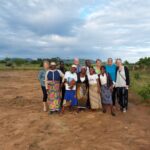
Post 2
On Saturday, we met with the Archbishop of Huambo, Zeferino Zecca Martins SVD at his residence in the city. The Archbishop was very interested in the campaign for the prevention of obstetric fistula and was very supportive of the work that is being done by Votoka, a local association focused on supporting and empowering women.
In the afternoon we travelled to Bailundo to meet with survivors of obstetric fistula and a fistula ambassador who is advocating on behalf of Votoka. Sat under a large mango tree, we heard the testimonies of 6 women who had lived with obstetric fistula, some for over 20 years. Their stories spoke of years of pain and discomfort, isolation and stigma before they were able to access fistula repair surgery.
In the evening, we visited a local community established project that incorporated a 5-km ‘Park Run’ track where the community all gather together on a Saturday morning. In the same location is a basketball court, volleyball pitch, multi-purpose community centre and library and other youth and community focused initiatives. We sat on the newly constructed wheelchair access viewing stand and watched many of the young people from surrounding villages playing basketball
Post 1
Yesterday, we visited the home of an obstetric fistula ambassador and his wife, an obstetric fistula survivor, on the outskirts of the town of Cassongue in the province of Cuanza Sul.
Marcolino, his wife Laurinda, and their extended family warmly hosted us at their home. They recounted their journey to surviving obstetric fistula and becoming fistula ambassadors.
Arrival:
AMRI’s JPIC Toni Pyke is currently in Angola on a field trip researching Obstetric Fistula. Here is her most recent update. ‘Today we visited Hospital Materno Infantil in Camama in Luanda, which was opened in June 2022. Here we met with Dra. Manuela Mendes, Director General of the hospital, and Dr. Paolo Parimbelli, principle fistula repair surgeon in Angola. Here we discussed the issue of the prevention of obstetric fistula.
We met with a surgeon and director of the hospital working with fistula patients for over 50 years!!’
To find out more keep an eye on this page.
Safe Motherhood Leave No-one Behind ; Prevention of Obstetric Fistula campaign BLOG
Obstetric fistula is preventable Advent Reflections
